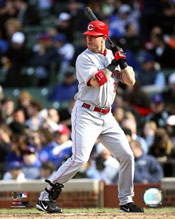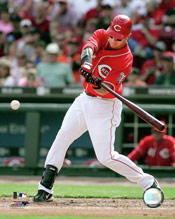Hamilton worth pulling for
04/04/2008
Stalter Home / Sports Channel / Bullz-Eye Home
Josh Hamilton.
Some see that name and think high school prodigy. Others see that name and think of the first overall pick in the 1999 MLB Draft.
And some see that name and immediately think waste of talent, drug addict or screw-up.
When I see that name, I think of an immensely talented baseball player who, just on talent alone, could have been a star by now if he hadn’t blown such a golden opportunity. But I also see that name and think redemption.
I don’t know Josh Hamilton. I’ve never met the man so I only know what I’ve read in newspapers and magazines. For all I know, he could be a pompous jerk, but that won’t stop me from rooting for him this season.
Hamilton was born and raised in Raleigh, North Carolina. There, he attended Athens Drive High School and was an outfielder and pitcher for the baseball team. He threw as hard as 96 mph, so for high school batters the ball probably looked like it was being shot from a cannon.
Coming out of high school, he was one of Baseball Prospectus’ top athletes, prompting the Tampa Bay Devil Rays to make him their first ever draft selection in 1999 and sign him to a then-record $3.96 million dollar contract.
He was thought of as Tampa’s cornerstone player, someone they could lean on for years as he grew into one of baseball’s brightest young stars. But he would become none of that.
While Hamilton was busy trying to work his way up from rookie-level Princeton to the Class-A South Atlantic League in 2000 and 2001, his parents would travel from Raleigh to watch him play. Hamilton officially had it all – talent, money, and a supporting family that wanted to be by his side when he fulfilled his immense potential.
But little did Hamilton know that just one event would send his life into a tailspin.
 While traveling through Tampa together in 2001, Hamilton and his parents were involved in a car wreck. His parents weren’t hurt and returned to Raleigh, but Hamilton injured his back and therefore had to go to Bradenton, Florida for rehab. He played in only 27 minor league games that season.
While traveling through Tampa together in 2001, Hamilton and his parents were involved in a car wreck. His parents weren’t hurt and returned to Raleigh, but Hamilton injured his back and therefore had to go to Bradenton, Florida for rehab. He played in only 27 minor league games that season.
When he returned to the field in 2002, he was off to a terrific start, batting .303 with nine homers and 44 RBI in 56 games. But lingering back and shoulder injuries caused him to miss most of the season.
While trying to recover and get back onto the field, Hamilton became bored. Even worse, he also started to get lonely. He was away from his home, parents and friends. For one of the first times in his life, he also didn’t have baseball to keep him occupied, so Hamilton took solace in hanging out at a nearby tattoo parlor.
The 26 tattoos that now cover his body are a constant reminder of how he foolishly spent his days and nights off the field while rehabbing in Bradenton. The memories of being introduced to heroin, cocaine and LSD are a constant reminder of how he almost lost everything.
In spring training of 2003, the Devil Rays reassigned their once promising draft pick to minor league camp. Dejected, Hamilton disappeared for six weeks and later admitted that during that span, he tried every drug he could get his hands on. He admitted at one point he had lost his home and car, but the only thing that mattered was getting his next high. It got to the point where he was dependent on drugs. If he wasn’t high, he wasn’t sane.
When he eventually returned to the club, then-manager Lou Pinella advised him to leave and get his life straightened out. Baseball also suspended him for 25 days for violating the league’s substance abuse policy.
Realizing his life was quickly spiraling out of control, Hamilton entered rehab, but it didn’t last. After suspending him an additional 30 days for once again being in violation of the league’s substance-abuse policy, Hamilton failed yet another drug test. Major League Baseball had had enough and on February 18, 2004, they suspended him indefinitely.
Hamilton would eventually quit and re-enter drug rehab eight times. In between stints, he would start using again and eventually his life was in absolute shambles. He lost 40 pounds, never slept and decided that the only way out was to take his own life.
He attempted suicide at least five times.
On his 24th birthday, he started to drink heavily while celebrating with his friends and wife Katie. After a fight with his wife, he shattered the windshield of a friend’s pickup truck and ripped off the rearview mirror. Fearing for her safety, as well as the safety of their two young children, Katie kicked Josh out.
So there he was – alone and depressed again. Drug dealers had taken most of the money he earned from his rookie-signing bonus. The rest went to rehab centers. He had lost baseball. He had lost his wife. He had lost his kids. He wanted to reach out, but was scared to go home to show his parents what their son had become.
So he paid a visit to grandma.
Mary Holt, Hamilton’s grandmother, took him in and for the first time in years, Josh started to turn his life around. He agreed to see a psychologist, started attending regular drug-counseling meetings, eventually began dating Katie again and was spending more time with his children.
His life was turning around, but there was still something missing. He had turned his back on the game of baseball, but was willing to work and sacrifice to get it back.
Hamilton attempted to join some independent leagues, but Major League Baseball and the Devil Rays intervened and halted that plan. So instead, he started working for Ron Silver and Randy Holland, two business partners who owned a baseball academy in Clearwater, Florida.
Silver and Howard gave Hamilton a place to stay and train, but he had to work to earn his keep. He mowed grass, took out the trash and even cleaned toilets. It was grunt work – especially for a guy that had once signed a rookie contract worth close to $4 million – but it was honest work and it kept Hamilton clean. It also allowed him to reconnect with the game.
 In June of 2006, Major League Baseball reinstated a finally clean Hamilton. After the Devil Rays failed to put him on their 40-man roster, he was selected third overall by the Chicago Cubs in the Rule 5 Draft. The Cubs then shipped him to Cincinnati, where he was one of the Reds’ best hitters in the spring of 2007.
In June of 2006, Major League Baseball reinstated a finally clean Hamilton. After the Devil Rays failed to put him on their 40-man roster, he was selected third overall by the Chicago Cubs in the Rule 5 Draft. The Cubs then shipped him to Cincinnati, where he was one of the Reds’ best hitters in the spring of 2007.
That year, Hamilton was second among rookies in slugging percentage, behind only Milwaukee’s Ryan Braun. He lost out to Braun for the NL Sporting News Rookie of the Year, as well as the Baseball America Rookie of the Year, but it didn’t matter – he had baseball back in his life.
In December of last year, the Reds traded Hamilton to the Texas Rangers for Edinson Volquez and Daniel Herrera. In the Rangers’ opener last Monday, he went deep off Mariners’ closer J.J. Putz in the top of the ninth inning to give Texas a 5-4 victory.
What’s even sweeter than the home run is the fact that he’s clean now. He’s admitted that it’s a constant battle every day to stay off drugs, but he’s found faith and even has a Christian life coach with him to make sure he stays focused. He also has to take frequent drug tests administered by MLB.
Some might think Hamilton didn’t deserve multiple chances to turn his life around. I get that. So few of us are blessed with enough talent to become professional athletes and it’s ridiculous to think anyone would waste such an amazing opportunity. Those of us who will never get the opportunity to play the game we love can look at Hamilton and say, “Why? If I had your opportunity, I wouldn’t muck it up. I would cherish it.”
But that isn’t the point. Isn’t life about how you respond to adversity? Isn’t it about getting your ass handed to you, but showing enough toughness to bounce back? We all slip up – we all make mistakes. But how do you respond in those instances?
Some people get second, third, fourth and even 10th chances to change their lives around and they still never do. At least Hamilton did and the best part is, he had to work for it. Nothing is handed to him now and he learned one of the biggest lessons of all: don’t take life for granted.
Not all of us are going to fall victim to drugs, but whether it’s alcohol, gambling, depression or even self-confidence issues, just about everyone has a weakness. Whether the Rangers win more games than they lose or Hamilton hits .300 with 20 home runs, it doesn’t matter. True character is revealed when times are bad, not when they’re good. And it’s true that Hamilton didn’t show strong character when things started to crumble in his life.
But maybe he’s showing his true character now.
Questions or comments? Send them to astalter@bullz-eye.com.






